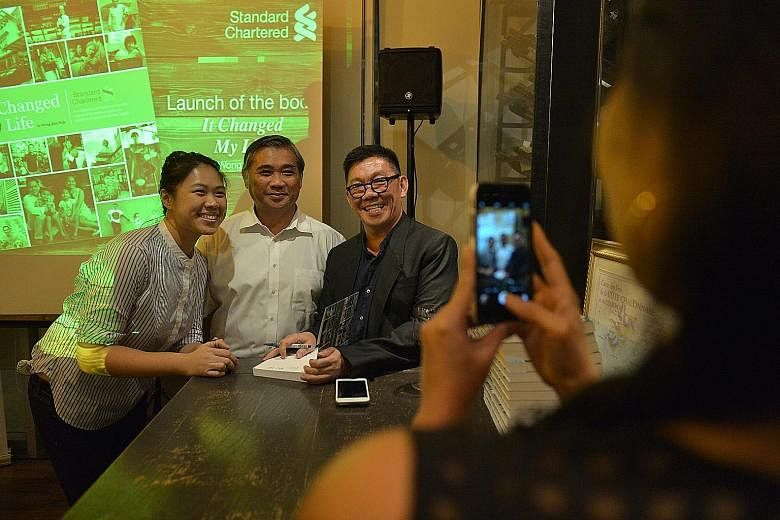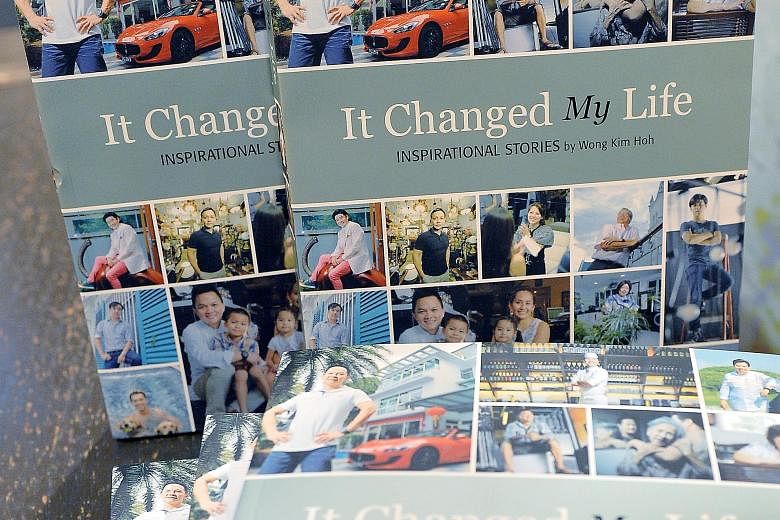Some people can run ultra-marathons. Others have an unerring ear for music. If Wong Kim Hoh has a special power, it would be: "I can make people talk."
The 54-year-old Straits Times senior writer, who helms the award- winning It Changed My Life weekly profile series in The Sunday Times, has a new book out.
It is a collection of 39 stories from this series and his earlier Wong Kim Hoh Meets series. The people featured include social worker Annie Siow, a former nightclub hostess who bounced back despite having her face disfigured by a suitor.
The new book follows a 2005 compilation of his much lauded A Life Less Ordinary series on extraordinary Singaporeans and two books of interviews with people behind bars, Criminal Intent and Criminal Intent 2.
Mr Wong, who has been in journalism for 26 years, often gets asked how he finds so many remarkable people with inspiring stories.
"I keep my ears and eyes open. You really don't know when you would come across someone interesting. Sometimes they are recommended by people," he said in an interview at Goodwood Park Hotel's Coffee Lounge.
He recounted how he was at an exhibition of photos by photographer John Clang a few years back when the curator told him a story.
The man in the photos was actually Clang's close friend, a cobbler who aspired to be a songwriter but was too shy. To bring him out of his shell, Clang got him to pose. The man became a mini celebrity after the photos were exhibited. And it was through the pictures that he met his wife.
"It's so strange that something can change your life like that," Mr Wong mused.
That gave him the idea for the It Changed My Life series, which started in 2013. It replaced the Wong Kim Hoh Meets series, mainly on subjects who went from rags to riches. He said he wanted to broaden the theme: "I want it to be such that your life can change through circumstances or the people whom you meet, illness or whatever."
The man in the photos was Mr Beon Kan, who later realised his dream and wrote songs like Ao Tu (Uneven), sung by Hong Kong artiste Gigi Leung. His story is one of the 39 in Mr Wong's new book.
Another question he often gets asked is how he gets interviewees to open up.
"I don't go with a fixed agenda. I feel it's really an art and also a craft to persuade people to trust you enough to tell you, and bare themselves," said Mr Wong. He recounted how a chief executive officer had confessed to an episode of cheating and broken down in tears during an interview.
Mr Wong would tell young reporters not to be so intent on getting a list of questions answered that they do not listen to what someone has to say. People could sense if someone is genuinely interested in their stories, he added.
It is not just interviewees who open up to him though. "Aunties" he buys food from would tell him of problems like their husband's infidelity, said Mr Wong, who is single.
In person, he is disarmingly soft-spoken with an infectious guffaw that draws you in, such as when he shares how people sometimes jokingly tell him: "Eh, you are very dangerous. Without meaning to, I have told you all these things."
Former drug addict Barry Yeow, 48, who has turned his life around, can testify to Mr Wong's knack for drawing stories out of people.
Mr Yeow, who was featured in Mr Wong's column in June, said: "I didn't find it like an interview, it was like friends talking to each other. I found it very easy to relate to him and to tell him what happened."
After the article came out, Mr Yeow's estranged mother and brother got in touch and reconciled with him.
Mr Yeow, who picked up art and is now an artist, also received more commissions and invitations to give talks. He has even patched things up with his former wife and they are planning to re-marry. He said of the article: "It changed every part of my life."
DEVOURED BOOKS
What changed the life of Mr Wong, the third of four children of a cigarette firm deliveryman and a cook and washerwoman, was his love of reading. "I never went to kindergarten. My parents were too poor. I did not know my alphabet when I went to school," said Mr Wong, who was born and grew up in Kuala Lumpur.
He and his family lived in a house with dozens of other families - each squeezed into a room. There was a well in the middle where occupants would brush their teeth, he recalled.
"The school was also jialat (horrible), with all from similar social backgrounds. You don't speak English at all."
Mr Wong, who was treated like a godson by a former bank robber, grew up with classmates who were gangsters, and older brothers who were educated in Chinese.
When he was in Primary Two or Three, a travelling library visited his school to sell books and he was enthralled. He bought a book from Enid Blyton's The Secret Seven series after begging his parents for $2 to $3, and forced himself to learn to read it.
That sparked his love for reading. He "barrelled through" many books, including Mills and Boon titles, and spent many weekends at the British Council library.
His English became so good that he was the only one from his secondary school to get an A1 for English in the O levels.
One day, after his A levels, Mr Wong was at the Singapore High Commission in Kuala Lumpur with a friend who wanted to apply to the National University of Singapore (NUS). "That was the other thing that changed my life - I never thought of applying to NUS," said Mr Wong, who is now a Singapore permanent resident.
The application fee was about $20 and his friend had to lend him the money. "I got in - he didn't."
"As it was, the fact that I got into NUS was a big thing for the clan. I was the first to make it to university," said Mr Wong.
His grandmother, aunt and uncle chipped in to help pay his tuition fees at NUS, where he majored in English and English Literature.
He was often down to just $10 and worked during the holidays, such as on the production line of a Mistral fan factory.
At NUS, he got to know the sister of Eric Khoo, who introduced him to the then budding film-maker. The two men became good friends and went on to work on scripts for various movies, including Be With Me and My Magic.
In 1986, after Mr Wong graduated, he wanted to go into journalism or advertising but the recession struck. He took on a lecturer post at Singapore Polytechnic, then a corporate communications job at Goodwood Park group.
In 1989, he joined The Straits Times, where he reported on entertainment and lifestyle. He cut his teeth on interviews with the likes of Tony Leung and Tsui Hark.
In the mid-1990s, he left ST to help launch lifestyle magazines including FHM before joining Project Eyeball, a shortlived print-online newspaper.
In 2003, Mr Wong, who was then The Sunday Times' features editor, had an idea for a series after interviewing several people, including a female embalmer, for a film project that was later dropped. A Life Less Ordinary was thus born.
He still remembers Ms Corina Zheng, the paralysed daughter of an ice-cream seller, and a "very lively person" who liked to send notes to friends.
She had taught her illiterate mother to type the notes by memorising the keyboard.
Readers were moved by Mr Wong's articles about them and offered mother and daughter monetary help. One gave them money regularly and paid for their funerals when they died a few years ago.
Mr Khoo, 50, said of Mr Wong: "His stories are told with humanity. There's a lot of passion in them. It has to do with Kim Hoh as a person, he's a giving and caring person."
For Mr Wong, talking to people about their greatest trials and triumphs - he has profiled nearly 200 in the last three years or so - has taught him not to "sweat the small stuff" and to be less judgmental.
Does he worry he will run out of people to profile?
"If you build it, they will come," he said, citing a line inspired by Field Of Dreams, one of his favourite movies. "And, touch wood," he said, knocking on the table.
"So far I have been okay," he said with a laugh.
•It Changed My Life - by the Straits Times Press, and sponsored by Standard Chartered Bank - is available for $29.96 at all leading bookstores. There is a Meet-The-Author session with Wong Kim Hoh on Saturday, 4pm, at the Kinokuniya main store, Ngee Ann City



